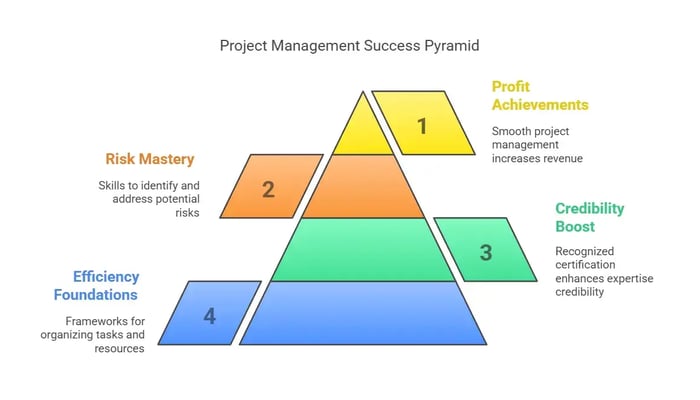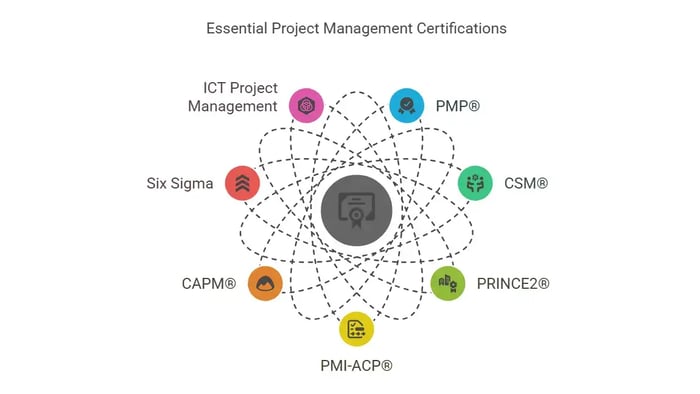Table of Contents
- Get Ready to Boost Your Business with These Game-Changing Certifications
- Why do Project Management Certifications for Entrepreneurs Matter?
- 1. Project Management Professional (PMP)®
- 2. Certified ScrumMaster® (CSM)
- 3. PRINCE2® (Projects IN Controlled Environments)
- 4. Agile Certified Practitioner (PMI-ACP®)
- 5. Certified Associate in Project Management (CAPM)®
- 6. Six Sigma Certification (Green Belt or Black Belt)
- 7. Project Management in ICT (Information and Communications Technology)
- 10 Lesser-Known Facts About Project Management Certifications for Entrepreneurs
- Final Thoughts: Why Choose APMIC Certifications?
- FAQs
Get Ready to Boost Your Business with These Game-Changing Certifications
Are you an entrepreneur looking to turn your project management skills into a powerful business asset? Well, buckle up because this blog is going to take you through the top 7 project management certifications for entrepreneurs that will set you on the fast track to business success. Whether you’re a startup guru or a seasoned entrepreneur, there’s something here to help you level up your skills. Ready to make your business management a breeze? Let’s dive in!

Why do Project Management Certifications for Entrepreneurs Matter?
Entrepreneurs are the backbone of any thriving economy, but let’s face it—managing projects without the right knowledge can feel like juggling flaming swords while riding a unicycle. Project management certifications aren’t just for large corporations—they're crucial for entrepreneurs too! Here’s why:

Improved Efficiency: Certifications provide entrepreneurs with frameworks that help organize tasks, resources, and time more efficiently.
Enhanced Credibility: Earning a recognized project management certification adds credibility to your expertise, which can be crucial when attracting clients, investors, or partners.
Better Risk Management: As an entrepreneur, mitigating risks and staying ahead of potential project pitfalls is key to survival. Certifications teach you how to identify and address risks early on.
Higher Profit Margins: Projects run smoothly when managed effectively, leading to more satisfied clients, repeat business, and ultimately, more revenue.
Now that we know why certifications are important, let’s explore the top certifications that are tailor-made for entrepreneurs!
1. Project Management Professional (PMP)®
Why it's perfect for entrepreneurs:
The PMP® certification, offered by the Project Management Institute (PMI), is the gold standard in project management. Widely recognized across industries, this certification is ideal for entrepreneurs looking to manage large-scale projects or even their internal business operations effectively. It focuses on best practices, tools, and techniques to drive successful project outcomes.
What you’ll learn:
Strategic and business management skills
Project initiation, planning, execution, monitoring, and closure
Team leadership and risk management
Pros:
Highly recognized globally
Applicable to all industries
Comprehensive project management toolkit
Cons:
Requires 3-5 years of project management experience (or related training)
The exam can be challenging, with a lengthy preparation process
Fun Fact:
Did you know that 93% of high-performing projects are led by PMP-certified professionals? (PMI). To dive deeper into PMP Certification, check out this comprehensive guide.
2. Certified ScrumMaster® (CSM)
Why it's perfect for entrepreneurs:
For entrepreneurs in tech, startups, and agile environments, Certified ScrumMaster® (CSM) certification is a must. Scrum is an agile framework that is perfect for projects that require flexibility and speed, which is often the case in entrepreneurial ventures.
What you’ll learn:
Scrum principles and practices
How to lead Scrum teams and promote collaboration
Agile tools for delivering projects faster and with better quality
Pros:
Great for technology and startup environments
Emphasizes flexibility and quick decision-making
No previous project management experience required
Cons:
Focuses primarily on Scrum methodology, which might not be as relevant for some industries
Pro Tip:
If you plan on scaling your business quickly, Scrum will help your team stay agile and responsive to market needs.
3. PRINCE2® (Projects IN Controlled Environments)
Why it's perfect for entrepreneurs:
The PRINCE2® certification is ideal for entrepreneurs who want a structured, process-based approach to project management. It is especially popular in Europe but is becoming increasingly recognized in the U.S. The methodology focuses on dividing projects into manageable stages, making them easier to control and monitor.
What you’ll learn:
How to manage projects through clear, defined stages
Risk and quality management
How to maintain project focus and deliver on time
Pros:
Highly structured approach
Suitable for large projects with multiple stakeholders
Widely adopted in public sector projects
Cons:
Might feel rigid for highly dynamic startups
More process-focused than outcome-focused
Bonus Read:
PRINCE2® provides a step-by-step guide to managing projects that can help streamline your operations and reduce delays.
4. Agile Certified Practitioner (PMI-ACP®)
Why it's perfect for entrepreneurs:
If you are an entrepreneur in a fast-moving, tech-based industry, the PMI-ACP® certification is your ticket to understanding agile principles in-depth. This certification offers a deep dive into agile methodologies and will teach you how to manage projects with a focus on flexibility and responsiveness.
What you’ll learn:
Agile tools, techniques, and methodologies
How to apply agile principles across projects and teams
Continuous delivery and improvement strategies
Pros:
Ideal for technology-focused startups and businesses
Emphasizes flexibility and continuous learning
Popular in software development industries
Cons:
Requires prior knowledge of agile principles
Best suited for businesses that are already agile or looking to be
5. Certified Associate in Project Management (CAPM)®
Why it's perfect for entrepreneurs:
If you're new to project management or just starting your business, the CAPM® certification is an excellent way to learn the fundamentals. It’s a great choice for entrepreneurs who want to lay a solid foundation for managing their business projects.
What you’ll learn:
Project management knowledge areas and processes
How to define and manage project scope, time, and cost
Communication, risk, and quality management
Pros:
Great entry-level certification for beginners
Provides a strong foundation in project management basics
Less time-consuming than higher-level certifications
Cons:
Not as advanced as PMP® for large-scale projects
Can be seen as a stepping stone to other certifications
6. Six Sigma Certification (Green Belt or Black Belt)
Why it's perfect for entrepreneurs:
Six Sigma is a methodology that focuses on improving quality and reducing defects in processes, which is essential for any growing business. If you’re an entrepreneur looking to optimize your internal processes and minimize waste, Six Sigma certification will give you the tools to achieve those goals.
What you’ll learn:
Process improvement tools and techniques
How to eliminate defects and reduce process variability
Data analysis and root cause analysis for business optimization
Pros:
Helps improve internal business processes
Focus on measurable results and continuous improvement
Applicable across a wide range of industries
Cons:
May require technical skills in statistics and data analysis
Requires more advanced study for Black Belt certification
Pro Tip:
For fast-growing businesses, Six Sigma can help maintain quality while scaling operations efficiently. For those interested in mastering the art of process improvement, our Six Sigma certification guide will provide all the details.
7. Project Management in ICT (Information and Communications Technology)
Why it's perfect for entrepreneurs:
Entrepreneurs in the tech industry will find value in a specialized project management certification like the Project Management in ICT certification. It focuses on managing complex technology projects and is perfect for those involved in software development, hardware management, and digital transformation.
What you’ll learn:
ICT project planning, execution, and delivery
Managing IT-specific risks, resources, and tools
Software development methodologies
Pros:
Focuses specifically on technology and digital projects
Ideal for entrepreneurs in the ICT sector
Addresses unique challenges within the tech industry
Cons:
Not as widely applicable outside of tech-related industries
Can be niche-specific for entrepreneurs in other fields

10 Lesser-Known Facts About Project Management Certifications for Entrepreneurs
PMP-certified project managers can earn up to 20% more than their non-certified peers.
Source: Project Management InstituteAgile methodology was originally developed for software development but is now used in many industries, including marketing and healthcare.
Source: Scrum AlliancePRINCE2® was developed by the UK government in the 1980s and remains one of the most widely adopted methodologies for managing projects in public sector organizations.
Source: AXELOSSix Sigma can reduce project defects by up to 50% when properly implemented in business processes.
Source: iSixSigmaAccording to PMI, 83% of high-performing projects are led by certified project managers.
Source: Project Management InstituteThe CAPM® certification is recognized globally and is a great entry point for those new to project management. It is especially beneficial for entrepreneurs just starting out.
Source: Project Management InstitutePMP® certification holders report an average of 18% higher salaries than those without certification, even in industries like construction and healthcare.
Source: PMI's Earning Power ReportThe Scrum Master role was initially conceptualized by Jeff Sutherland and Ken Schwaber in the early 1990s and was later formalized as the Scrum methodology.
Source: Scrum.orgApproximately 60% of project managers in the U.S. are PMP® certified, highlighting its growing importance across industries.
Source: PMI's Global Project Management SurveyA study by the Standish Group found that projects using Agile methods have a 64% success rate, compared to only 49% for traditional waterfall projects.
Source: Standish Group
Final Thoughts: Why Choose APMIC Certifications?
At APMIC, we provide top-notch project management certifications that are tailored to meet the demands of today’s ever-evolving business landscape. Whether you're an aspiring entrepreneur or an established professional, APMIC's Project Management Certifications will help you gain the skills and credibility you need to succeed. Start your journey with APMIC today!
FAQs
What is the best project management certification for entrepreneurs?
The PMP® certification is the most universally recognized and comprehensive option for entrepreneurs looking to manage large projects effectively.
Can entrepreneurs benefit from the Agile methodology?
Absolutely! Agile is perfect for entrepreneurs, especially those in fast-paced environments where adaptability is key.
How long does it take to get certified in project management?
Depending on the certification, it can take anywhere from a few months to a year to get fully certified.
What is the difference between PMP® and PRINCE2®?
While both certifications focus on project management, PMP® is broader and more globally recognized, while PRINCE2® is more process-focused and widely used in Europe.
Is the CAPM® certification worth it?
Yes, the CAPM® is a great starting point for entrepreneurs new to project management and looking to learn the basics.
How does Six Sigma help entrepreneurs?
Six Sigma focuses on optimizing business processes, reducing waste, and improving overall quality—key for any entrepreneur looking to streamline operations.
Can I do project management without a formal certification?
While it’s possible, formal certifications like PMP® provide credibility and essential skills that help in managing projects efficiently.
What industries benefit from project management certifications?
Most industries benefit, including IT, construction, healthcare, and marketing.





